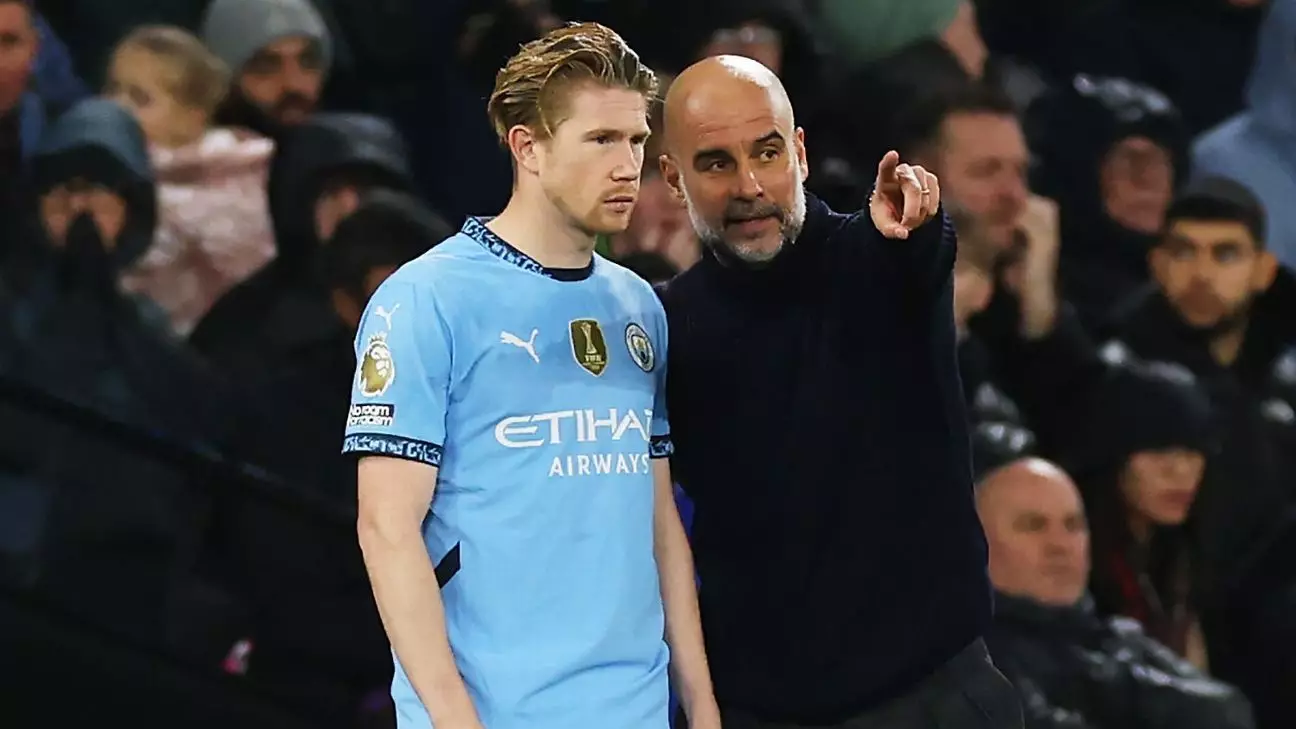In the high-stakes world of football, relationships between managers and players are often fraught with complexity and scrutiny. Recent events at Manchester City have exemplified this dynamic, particularly in the case of manager Pep Guardiola and midfielder Kevin De Bruyne. The ongoing speculation surrounding their relationship has prompted commentary from pundits and fans alike, culminating in questions about the implications of De Bruyne’s limited playtime since recovering from injury.
Kevin De Bruyne, celebrated as one of the most gifted midfielders in the sport, has had a tumultuous return to action. After suffering an abdominal injury in September against Inter Milan, his participation in matches has been severely curtailed. With only five appearances as a substitute over the subsequent months, many have raised eyebrows at Guardiola’s decisions, particularly during pivotal moments like the recent match against Liverpool. On that occasion, it wasn’t until City was trailing 2-0 that De Bruyne was summoned from the bench, leading to intense speculation about underlying issues between the two.
Sky Sports pundits Gary Neville and Jamie Carragher expressed their concerns openly, characterizing De Bruyne’s omission as “bizarre” and suggesting that there might be unresolved tensions affecting team dynamics. Such comments indicate a broader concern among observers regarding Guardiola’s management style and his handling of star players, particularly when the team is underperforming.
In response to the rising speculation, Guardiola found himself addressing the elephant in the room during a recent press conference, albeit without a direct prompt. His remarks sought to quell rumors of animosity, affirming his respect for De Bruyne and acknowledging the contributions the Belgian has made to Manchester City over the years. Guardiola emphasized that any notion of a personal rift was entirely unfounded, insisting that he would never wish to exclude a player of De Bruyne’s caliber from his squad.
However, the manager also highlighted the reality of De Bruyne’s situation. At 33 years old and returning from significant injury setbacks, Guardiola stressed that the midfielder simply requires time to regain his peak form. This acknowledgment shifts the narrative from personal conflict to a more nuanced view of player fitness—a critical element for any footballer, particularly one with a history of injuries.
Guardiola’s comments about De Bruyne’s age and fitness level bring to light the often-ignored aspect of sports: the physical toll of the game. At 33, De Bruyne is no longer in his prime, making recovery from injuries more challenging. Guardiola was candid when he noted that while he longs for De Bruyne in his prime, the current reality requires a different approach. The club’s ambitions must be balanced against the player’s physical limits, a sentiment often reflected by coaches managing aging talents.
Additionally, Guardiola cautioned against pinning all hopes on De Bruyne’s return as a singular solution to the team’s issues. He acknowledged that while De Bruyne possesses unique abilities that can dramatically influence a match’s outcome, football is intrinsically a collective sport. Success relies on effective teamwork, and no single player can carry a team alone. This philosophy is crucial, particularly as the team confronts a series of disappointing results, with four consecutive league defeats resulting in a drop to fifth place in the Premier League.
As Manchester City prepares for their upcoming match against Nottingham Forest, there is a palpable sense of urgency in the air. Guardiola’s insistence that De Bruyne remains a valuable asset to the team reflects a desire to reintegrate him effectively and strategically into the lineup. The managerial strategy appears rooted in patience rather than desperation, understanding that rushing De Bruyne back could exacerbate existing problems rather than solve them.
The situation between Guardiola and De Bruyne is emblematic of the broader challenges faced in professional football, where management decisions must navigate player health, team dynamics, and public scrutiny. As De Bruyne strives to reclaim his place in a struggling squad, the club must collectively assess how to leverage its star players effectively while fostering an environment conducive to long-term success. Only time will reveal how this intricate dance between player and manager will unfold in one of football’s most scrutinized environments.

